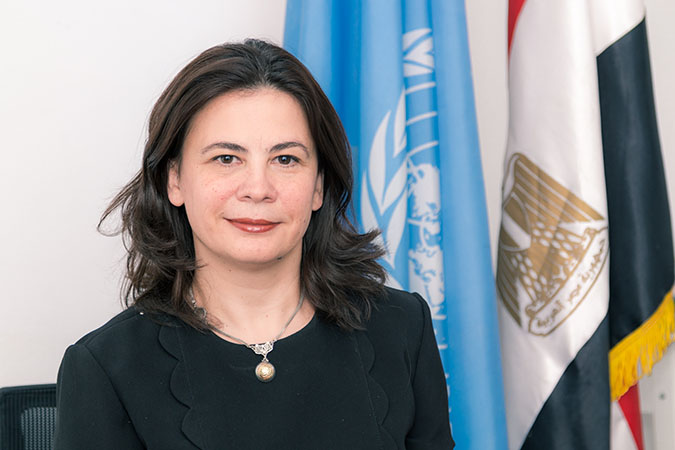Coming together – Women’s Social Capital for Women’s Financial Inclusion in Egypt
By: Blerta Aliko, Representative, UN Women EgyptDate:

Ms. Blerta Aliko, UN Women Egypt Country Representative. Photo: UN Women/Ismail Hamdy.
As concepts and buzzwords on women’s financial inclusion increasingly penetrate boardrooms and local communities alike, the gender gap in accessing the formal financial system persists globally. According to the latest Global Findex data, 56% of the 1.7 billion of adults worldwide who do not have a bank account are women and data on account ownership shows a gender gap at 9% in favour of men across all developing economies[1].
In Egypt, significant efforts have been made to increase women’s access to financial products and services. According to the Global Findex Database, formal account ownership among women has more than tripled between 2011 and 2017 (from 7% to 27%). However, it is still below the rate among men (39% in 2017).
Financial inclusion: a key enabler to escape poverty
Financial inclusion has been identified as key to reducing poverty and fostering economic growth and is significant for the realisation of seven SDGs[2]. It is commonly defined as the effective access to a range of financial products and services that are adapted to people’s multiple needs (in terms of business, household economy, education, health, etc.) and to the different socioeconomic and cultural contexts they navigate in[3]
Research has shown that financial inclusion can boost consumption, self-employment and foster SME growth, asset accumulation, risk mitigation and speed wealth creation Therefore, it has been also identified as a valuable tool in fostering women’s economic empowerment by enabling them to engage in measurable economic activities, and set the basis for sustainable economic development at large[4]. Therefore, women’s financial management capacity and economic independency are enhanced.
When designed using a gender sensitive approach, digital financial services (available through digital financial technology (‘fintech’) and the widespread use of mobile phones) offer additional tools to boost women’s economic empowerment. Digitalisation has facilitated expanding access to financial services to hard-to-reach populations (mostly women) and small businesses (often women-owned) at low cost and risk. Fintech addresses important barriers in accessing financial products and services, such as women’s reduced mobility due to unpaid domestic work, time constraints, social norms and cost of transportation[5].
Village Savings and Loans Association as the social platform for Women’s Financial Inclusion in Egypt
The current environment holds huge potential for women’s financial inclusion in Egypt. Egypt’s National Women’s Empowerment Strategy and its accompanying pillar on Women’s Economic Empowerment list women’s access to economic resources, through increased access to financial services, as an important objective. Strong political will for regulatory reform is evident, particularly with the approval of the Microfinance Law (No. 141 of 2014), which strengthens regulations on microcredit provided by non-bank financiers allowing them to enter the formal microfinance sector. Political commitment is also demonstrated by the ‘National Council for Payments’, which supports electronic payment systems. These efforts have been internationally recognised in July 2017 when Egypt was chosen as a model in the new World Bank Financial Inclusion Global Initiative. However, there are still challenges to be addressed, with a need for new regulations on group mobile wallets and other financial services that particularly cater for marginalised women.
Financial institutions and regulatory bodies are also joining the widening array of actors supporting financial inclusion. In 2016, the Central Bank of Egypt (CBE) approved new regulations for ‘Mobile Payment Services Regulations’ allowing customers to transfer funds and remittances via their mobile accounts. The CBE also supported the Government of Egypt in hosting the 2017 Alliance for Financial Inclusion Global Policy Conference, in which more than 94 States and 119 international institutions participated. As a result, the CBE and the National Council for Women (NCW) agreed to work jointly on fostering women’s financial inclusion.
In line with the joint efforts implemented, NCW and UN Women Egypt have been advocating for implementing and expanding a tested model on reaching the most vulnerable and marginalized women in society through sustaining and transforming the social capital of Village Savings and Loans Associations (VSLAs) into a broad base platform for financial inclusion of Egyptian women. The VSLAs target poor and marginalized women in rural communities, empowering them through participation in savings and loan groups, supporting them to better manage household cash whilst investing in income generating activities. In one programme alone, in partnership with CARE International and funded by the European Union, UN Women Egypt have supported the establishment of 1,036 VSLA groups in Assiut, Menia and Beni Suef, comprising of 18,844 members (92% of which are women) with a total savings of EGP 4,577,190, alongside financial literacy trainings and non-financial services.
Applying the SDGs principle of “leaving no one behind”, capitalizing on the social capital of women is necessary for the progress of any public or private stakeholder. The VSLA offers a ready platform for accessing the furthest left behind first which is appealing to Micro Financial Institutions because of significant lower “acquisition” cost as they develop women clientele from the bottom of the pyramid. It is also appealing for banks as the approach builds on the savings concept and not on loans that carry the perceived risk of debt.
The stage is set for large scale action on Women’s financial inclusion. For its part, UN Women is rallying a call for action for interested stakeholders to unite and comprehensively work together within a unified strategy, in which tested and standardised models for VSLA expansion are implemented, leading to financial inclusion through technological digital solutions while focusing on developing enabling regulatory laws and policies and outreach activities that can rapidly increase women’s financial inclusion.
[1] The World Bank (2017), The Global Findex Database, Measuring Financial Inclusion and the Fintech Revolution.
[2] http://www.worldbank.org/en/topic/financialinclusion/overview#2
[3] http://www.cgap.org/topics/women-and-financial-inclusion
[4] DFID (2013), Promoting women’s financial inclusion A toolkit
[5] http://www.worldbank.org/en/topic/financialinclusion/overview#2